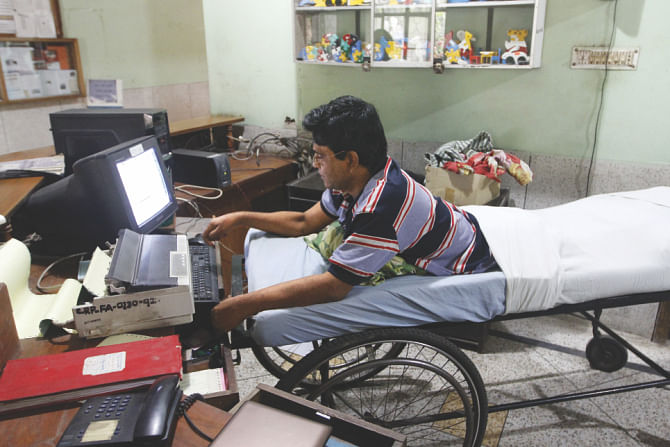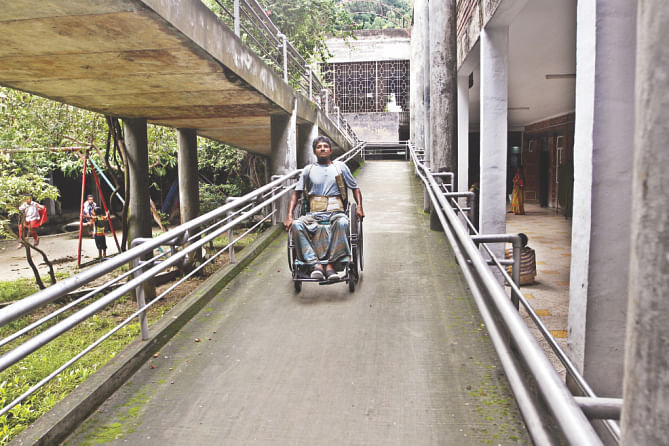The Light at the End of the Tunnel

Founded in 1979 in response to the desperate need for services for spinal injured patients, the Centre for the Rehabilitation of the Paralysed (CRP) has grown into an internationally respected organisation. Today CRP is the only organisation of its kind in Bangladesh, a country with a population of more than 150 million. The World Health Organisation (WHO) estimates that 10% of the population in Bangladesh is disabled. CRP focuses on a holistic approach to rehabilitation, recognising that all aspects of the rehabilitation process are vital for its success:
Physical rehabilitation includes medical and therapeutic interventions and the provision of appropriate mobility aids. Counselling and sharing of experiences, meanwhile, are part of the psychological rehabilitation.
CRP provides vocational re-training and helps its patients to get micro-credit loans so that they can start earning – a part of the economic rehabilitation.

Even after they go home, CRP continues to take care of them, making sure that their homes are safe and accessible, that people around them are sensitive to their needs.
Sub-centres of CRP
CRP's headquarters is in Savar with sub-centres in Mirpur, Rajshahi, Barisal, Chittagong, and Moulvibazar where pateients are treated for Spinal Cord Injury. In addition, CRP-Ganakbari is a residential vocational re-training centre for disabled women and girls and CRP-Gobindapur is a centre for out-patient and community based services. Community Based Rehabilitation (CBR) projects operate in 13 districts.
Training for health professionals
CRP's academic institute, the Bangladesh Health Professions Institute (BHPI) has pioneered the training of relevant health professionals in Bangladesh. Some courses are the only ones of their kind in the country.
CRP also awards merit-based scholarships every year for academic excellence of its students. Stipends and free tuition are also provided on need basis.
Impact on the society
CRP continuously aims to educate people through various programmes, on safe working and living practices. It attempts to break down the barriers, superstitions and stigma which prevent disabled people from enjoying equal rights and opportunities.
After the collapse of Rana Plaza in 2013, CRP was one of the first responders providing medical teams on the spot, blood bags, ambulances and other vital medical assistance. It also provided longterm support and rehabilitation for victims with spinal cord injuries, amputation of limbs and any other disabilities. CRP is dedicated to helping those affected by the disaster and they are able to do this by providing treatment, therapy, assistive and mobility devices, artificial limb/legs and livelihood training free of charge.
Medical Service Wing at Savar
The hospital at CRP-Savar is the only hospital in Bangladesh that specialises in the treatment of spinal cord injuries. The 100-bed hospital receives over 400 admissions as in-patients each year. Some patients are managed conservatively, whilst others require surgical intervention. The majority of patients arrive long after their accident or illness, when complications are difficult to manage. CRP has two well-equipped operating theatres. Several different surgical procedures are carried out at CRP including spinal fixation, surgery on spinal tumour and club foot.
Patients admitted to CRP-Savar with spinal cord injuries of both traumatic and non-traumatic origin are treated in the rehabilitation wards through a holistic approach, by a multidisciplinary team (MDT). Out-patient services are available six days a week, except government holidays, from 8:00 am to 5:00 pm except Thursday (8:00 am to 1:30pm).
CRP has a highly skilled nursing staff complemented by input from foreign volunteers. The nurses are engaged to look after the patients' physical condition. This includes bladder neuropathy, bowel and pressure sore management. Pressure sores are the main complication for paralyzed patients. Measures are taken in order to prevent pressure sores developing. Special dressing techniques are required to aid wound healing as well as treatment for infection and blood transfusions if necessary. Pack beds are used, which are designed to relieve pressure from the wound area. Improved diet is offered with additional nutritious foods and vitamin supplements. Where necessary, reconstructive surgery is performed to manage the unhealed sore.
CRP has a Nursing College that offers a four-year B.Sc. Nursing and a three-year Diploma in Nursing Science and Midwifery.

 For all latest news, follow The Daily Star's Google News channel.
For all latest news, follow The Daily Star's Google News channel. 



Comments